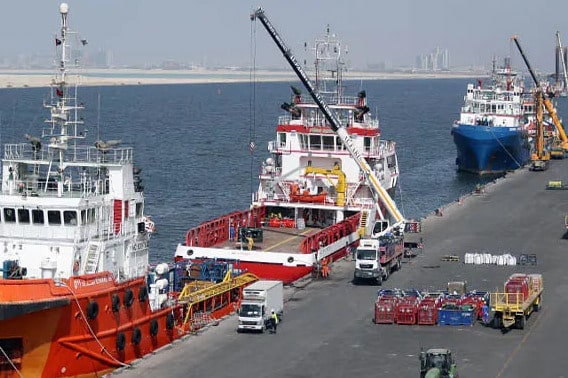ADNOC L&S plays a role in delivering energy worldwide.
ADNOC Logistics & Services (ADNOC L&S), the shipping and maritime logistics arm of Abu Dhabi National Oil Company (ADNOC), has a crucial role to play in the global energy supply chain. The company is responsible for transporting oil and gas from Abu Dhabi to destinations around the world, and has played a key role in enabling the UAE to become a major player in the global energy industry.
ADNOC L&S operates a fleet of more than 120 vessels, including tankers, bulk carriers, and offshore support vessels, and provides a range of services including shipping, offshore logistics, and marine services. The company has a presence in more than 20 countries and works with some of the world’s largest oil and gas companies.
One of the key areas where ADNOC L&S has made an impact is in the transport of liquefied natural gas (LNG). The company operates a fleet of LNG carriers that transport gas from Abu Dhabi to markets around the world, including Asia and Europe. ADNOC L&S also operates a number of floating storage and regasification units (FSRUs) that enable the company to import LNG from other countries and store it offshore until it is needed.
In addition to its LNG operations, ADNOC L&S also transports crude oil and other petroleum products, as well as providing offshore logistics support to the oil and gas industry. The company’s offshore support vessels provide a range of services including platform supply, anchor handling, and towing, and are used to support offshore exploration and production activities.
ADNOC L&S is also a leader in the use of technology to improve efficiency and reduce costs. The company has invested heavily in digital technologies such as automation, artificial intelligence, and data analytics to optimize its operations and improve safety. For example, ADNOC L&S has developed a digital twin of its fleet that enables the company to monitor the performance of its vessels in real time and make adjustments to improve efficiency and reduce fuel consumption.
By leveraging its digital initiatives, ADNOC L&S has been able to reduce OPEX and CAPEX costs while improving safety and reliability of operations. It also uses predictive analytics to anticipate potential problems before they occur. This allows the company to be proactive in addressing issues, resulting in improved operational efficiency and cost savings.
The company has also been active in exploring new technologies such as autonomous vessels and alternative fuels. In 2019, ADNOC L&S partnered with Rolls-Royce to develop an autonomous tug that could be used to assist in ship docking and undocking operations. The company has also been exploring the use of alternative fuels such as liquefied natural gas and hydrogen to power its vessels.
ADNOC L&S is committed to sustainability and has set ambitious targets to reduce its environmental impact. The company has a target to reduce its greenhouse gas emissions by 25% by 2030, and has implemented a number of measures to achieve this goal. These include the use of low-sulfur fuels, the installation of energy-efficient technologies on its vessels, and the implementation of waste management and recycling programs.
The company is also committed to supporting the development of local talent and has launched a number of initiatives to promote careers in the maritime industry. In 2020, ADNOC L&S launched a cadetship program to provide training and development opportunities for young Emiratis who are interested in a career in the maritime industry. The program includes classroom training, on-the-job experience, and mentoring from experienced professionals.
Overall, ADNOC L&S plays a critical role in the global energy supply chain, transporting oil, gas, and petroleum products to destinations around the world. The company is committed to using technology and innovation to improve efficiency and reduce costs, while also promoting sustainability and supporting the development of local talent. As the global energy landscape continues to evolve, ADNOC L&S is well positioned to play a key role in meeting the world’s growing demand for energy.






mkx cart prices
… [Trackback]
[…] There you will find 29204 additional Info to that Topic: ceoweeklyuae.com/adnoc-ls-plays-a-role-in-delivering-energy-worldwide/ […]
December 17, 2024สล็อตเว็บตรง รวมเกมทุกค่ายดังบนมือถือ
… [Trackback]
[…] Find More on that Topic: ceoweeklyuae.com/adnoc-ls-plays-a-role-in-delivering-energy-worldwide/ […]
December 19, 2024สํานักงานบัญชี
… [Trackback]
[…] Information on that Topic: ceoweeklyuae.com/adnoc-ls-plays-a-role-in-delivering-energy-worldwide/ […]
January 6, 2025Lottovip98
… [Trackback]
[…] Read More on to that Topic: ceoweeklyuae.com/adnoc-ls-plays-a-role-in-delivering-energy-worldwide/ […]
January 30, 2025helpful resources
… [Trackback]
[…] Information on that Topic: ceoweeklyuae.com/adnoc-ls-plays-a-role-in-delivering-energy-worldwide/ […]
February 5, 2025JBO THAILAND เว็บแทงบอล คาสิโน สล็อต หวย
… [Trackback]
[…] Find More here to that Topic: ceoweeklyuae.com/adnoc-ls-plays-a-role-in-delivering-energy-worldwide/ […]
February 16, 2025บุหรี่นอกราคาถูก
… [Trackback]
[…] Information on that Topic: ceoweeklyuae.com/adnoc-ls-plays-a-role-in-delivering-energy-worldwide/ […]
February 21, 2025ยิง sms
… [Trackback]
[…] Here you will find 80138 additional Info on that Topic: ceoweeklyuae.com/adnoc-ls-plays-a-role-in-delivering-energy-worldwide/ […]
March 8, 2025wings789
… [Trackback]
[…] Find More on that Topic: ceoweeklyuae.com/adnoc-ls-plays-a-role-in-delivering-energy-worldwide/ […]
March 13, 2025hit789
… [Trackback]
[…] Read More Info here on that Topic: ceoweeklyuae.com/adnoc-ls-plays-a-role-in-delivering-energy-worldwide/ […]
March 13, 2025pgslot168
… [Trackback]
[…] Read More Info here to that Topic: ceoweeklyuae.com/adnoc-ls-plays-a-role-in-delivering-energy-worldwide/ […]
March 19, 2025Fulfillment
… [Trackback]
[…] Find More on that Topic: ceoweeklyuae.com/adnoc-ls-plays-a-role-in-delivering-energy-worldwide/ […]
March 20, 2025vibrant colors whiteboard markers
… [Trackback]
[…] Read More Info here on that Topic: ceoweeklyuae.com/adnoc-ls-plays-a-role-in-delivering-energy-worldwide/ […]
March 24, 2025погана якість
… [Trackback]
[…] Find More on on that Topic: ceoweeklyuae.com/adnoc-ls-plays-a-role-in-delivering-energy-worldwide/ […]
April 1, 2025pin up casino app
… [Trackback]
[…] There you can find 99509 more Information to that Topic: ceoweeklyuae.com/adnoc-ls-plays-a-role-in-delivering-energy-worldwide/ […]
May 4, 2025Flowserve pump
… [Trackback]
[…] There you will find 65765 more Info to that Topic: ceoweeklyuae.com/adnoc-ls-plays-a-role-in-delivering-energy-worldwide/ […]
May 10, 2025ปลูกผม
… [Trackback]
[…] Find More on that Topic: ceoweeklyuae.com/adnoc-ls-plays-a-role-in-delivering-energy-worldwide/ […]
May 19, 2025https://www.webassured.com/how-to-ensure-your-online-security-while-enjoying-casino-games/
… [Trackback]
[…] Find More Information here on that Topic: ceoweeklyuae.com/adnoc-ls-plays-a-role-in-delivering-energy-worldwide/ […]
June 4, 2025จัดงานศพครบวงจร
… [Trackback]
[…] Read More to that Topic: ceoweeklyuae.com/adnoc-ls-plays-a-role-in-delivering-energy-worldwide/ […]
June 10, 2025